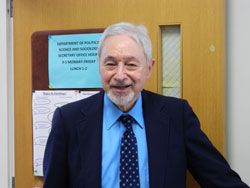Dr. Enoch Nappen, an associate professor of political science, is retiring after 55 years of teaching at the University at the conclusion of the Spring 2015 semester. Nappen is the longest-serving faculty member in the history of the University, according to a resolution crafted by the political science and sociology department dated on April 1.
President Paul Brown said, “Even as I congratulate Dr. Nappen on a well-deserved retirement, I know the many years of wisdom he has shared with our students will endure as part of his legacy as an educator.”
Nappen started teaching at the University in 1960, recently after the junior college became Monmouth College in 1956. Nappen said, “The school is absolutely magnificent. It’s a beautiful school, they’ve been adding all these new buildings and it’s just a beautiful environment. I am so proud of the school. The degrees of my family that have graduated here have increased in their meaning.”
Nappen said, “Often in life, things can work out in surprising ways. I never originally thought of teaching. I always knew I wanted to be a professional, but I assumed I would be a lawyer.” Nappen said that he was accepted into the law program at Rutgers University following high school; however, he postponed his acceptance to be a military officer in Washington, DC for two years. On a weekend visit to Rutgers, he was encouraged to apply for the World Peace Fellowship by the Chairman of the Political Science Department. Nappen won the scholarship and spent the next year earning his Master’s Degree.
Upon earning his Master’s Degree, Nappen was hired at Monmouth College to teach five courses per semester, covering a variety of topics and occasionally filling in for other professors in the department. At the time, the department consisted of history, political science, geography, and sociology.
Nappen said that a favorite memory of his was when the University was still centralized in Wilson Hall. Nappen and other faculty members would sit around the pool that used to be in front of Wilson Hall for lunch. Nappen said that he really enjoyed getting to meet people from other departments.
Nappen said, “You wonder why I would stay here for so long, but there’s nothing better to life than where your vocation or advocation is something you enjoy and you’re with nice people. We have a really great department with fantastic people here.”
Kristen Gillette, Secretary of the Political Science Department, said, “I feel very fortunate to have been able to work with Dr. Nappen. He is committed to the Monmouth University students and has always been a great leader and colleague in our department.”
Dr. Saliba Sarsar, Associate Vice President for Global Initiatives, said, “Dr. Nappen is a dedicated teacher and a gentleman. I have known him for 38 years, initially as a professor and later as a thoughtful department chair and a wonderful colleague.”
Eventually, Nappen applied to New York University for his Doctorate. Nappen said, “Not going for an advanced degree just never entered my mind, so I went to NYU and I went for my Doctorate. I completely decided not to go to law school, I just really enjoyed teaching.”
According to the resolution dated on April 1, Nappen has taught over 400 courses on constitutional law, civil liberties, and American government, rewriting all of his lectures after the Civil Rights Act of 1964 was enacted.
Meghan Hess, a senior political science major, said, “One of my favorite things about Dr. Nappen and his class is that he teaches you a lot but somehow manages to still keep it fun. He will slip jokes into his lectures nonchalantly and keep the class on their toes.”
“As a colleague, it was Dr. Nappen’s dry sense of humor that I will remember the most. He was always good for a quick one-liner that could often lighten up any setting,” said Dr. Joseph Patten, Chair of the Political Science Department.
“As a professor, Dr. Nappen could lecture on a topic without the aid of any technology or notes. From memory, he could pull the most nuanced opinions from Supreme Court decisions or pieces of legislation. It is a truly remarkable feat to be able to stand in front of a classroom and lecture for more than an hour without any aid. It is equal parts theatre and teaching,” continued Patten.
Brown said, “During his long tenure at Monmouth, Dr. Nappen has influenced generations of students. Our most recent Distinguished Alumni Award winner, Thomas Gallagher, said at Founders’ Day that it was one of Dr. Nappen’s classes that inspired him to join the Peace Corps in Ethiopia following graduation; an experience that propelled him into a successful career as a diplomat.”
According to the resolution, in addition to helping students from all majors prepare for the law school admission test, Nappen has supervised thousands of internships in the legal field. Sarsar said, “Dr. Nappen promoted the idea of experiential education long before it was fashionable or a graduation requirement at Monmouth University and other institutions of higher learning. He has always put students first. He has inspired countless students to pursue careers in law and become accomplished lawyers, prosecutors, and judges.”
Nappen served as Chair of the Political Science Department from 1978 to 1984 and played a leading role in introducing the national political science honor society, Pi Sigma Alpha, to campus, according to the resolution dated on April 1. Nappen is also a member of the Token and Medal Society, the New York Photographic Historical Society, and the American Political Items Collectors. Furthermore, Nappen served as a member of the Speakers Bureau in 1960.
Sarsar said, “Dr. Nappen has served Monmouth University with distinction. As alum, professor, and academic administrator, I extend to him my heartfelt thanks and wish a happy retirement.”
Nappen said that he looks forward to spending time with his family after retiring. Nappen’s three children attended the University and contributed as student president and editor-in-chief of The Outlook, amongst other accomplishments. His wife finished her degree at the University as well. President Brown said, “Dr. Nappen has become part of the fabric of Monmouth. One of Dr. Nappen’s sons, Louis Nappen, who is an alumnus, wrote the words to the University alma mater.”
Hannah Loux, a senior political science major, said, “Dr. Nappen was such a genial man. He also made it known that he loves his family a lot, so it’s really great that he’ll be able to spend time with them.”
Nappen said that he has always loved music and also looks forward to learning how to play the piano once he retires. Nappen is an avid collector of various items, owning thousands of famous sheet music from the 1920’s through the 1950’s. Additionally, Nappen has one of the country’s foremost private collections of political campaign memorabilia, published in the 2008 book titled “Warman’s Political Collectibles: Identification and Price Guide.”
When asked to provide a culminating piece of advice for the students, Nappen referred to a quote by author Oscar Wilde. Nappen said, “The cost of everything, but the value of the nothing’. That is a favorite of mine. That’s a very important reference to know how important something really is, the value of it, and that can be much more than the cost.”
The resolution stated, “We, his faculty colleagues join together in thanking Professor Enoch Nappen, and honoring and celebrating his legacy of dedicated service, passion for teaching, warm collegiality, ever-quick wit, and loyalty to Monmouth University. With all this, and his unparalleled record of dedicated teaching in Political Science, he is truly a living monument of institutional and disciplinary history.”
PHOTO COURTESY of Kristen Gillette




